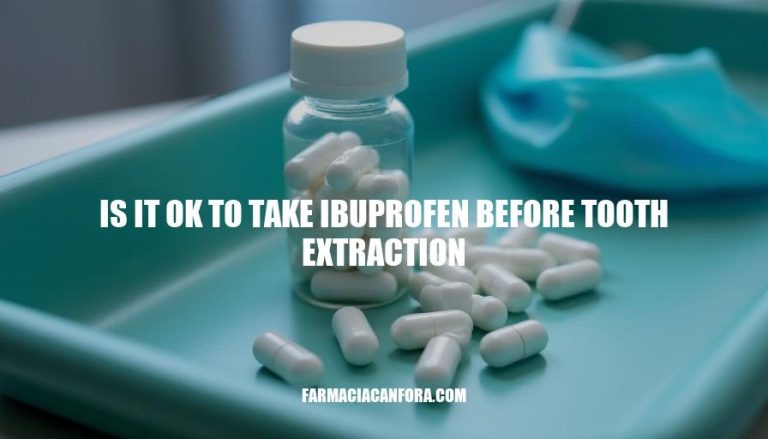


Is it okay to take ibuprofen-for-tooth-extraction”=”” farmaciacanfora.com=”” href=”https://farmaciacanfora.com/can-i-take-<a href=” https:=””>ibuprofen-before-tooth-extraction”>ibuprofen before a tooth extraction? This is a common question, and understanding the answer is crucial for a safe and smooth surgical experience. Preoperative medication guidelines are essential because certain medications, like ibuprofen, can affect blood clotting and increase the risk of bleeding during and after surgery. Therefore, it’s important to follow your dentist’s or surgeon’s advice on medication use before any procedure to minimize complications and ensure optimal recovery.
Before a tooth extraction, it’s generally advised to avoid taking ibuprofen. This is because ibuprofen, a nonsteroidal anti-inflammatory drug (NSAID), can increase the risk of bleeding by affecting blood clotting.
However, ibuprofen is often recommended for managing pain and inflammation after the procedure. It’s crucial to follow your dentist’s or healthcare provider’s specific instructions regarding medication use before and after the extraction. They can provide personalized advice based on your medical history and any other medications you might be taking.
Always consult with a healthcare provider to ensure you’re making the safest and most effective choices for your situation.
Taking ibuprofen before a tooth extraction can offer several benefits:
Pain Management: Ibuprofen is an effective pain reliever. It helps manage discomfort during and after the procedure, making the experience more tolerable for patients.
Reduction of Inflammation: As a nonsteroidal anti-inflammatory drug (NSAID), ibuprofen reduces inflammation at the extraction site. This can help minimize swelling and promote faster healing.
Enhanced Pain Relief: Studies, such as one conducted by the School of Dental Medicine at Case Western Reserve University, have shown that ibuprofen, especially when combined with acetaminophen, provides more effective pain relief than opioids.
Expert Opinions: The American Dental Association supports the use of ibuprofen for its anti-inflammatory properties, which help reduce pain and swelling post-extraction.
Taking ibuprofen before a tooth extraction can increase the risk of complications, particularly related to bleeding. Here are the key points:
It’s crucial to follow your dentist’s instructions closely to ensure a smooth and safe tooth extraction process.
Taking ibuprofen before a tooth extraction can increase the risk of bleeding and other complications, but it may be recommended for pain management after the procedure.
It’s essential to consult with a healthcare provider to determine if it’s safe to take ibuprofen before the extraction, as they can provide personalized advice based on your medical history and specific situation.
They can also recommend alternative pain relief options that don’t affect blood clotting.
Ultimately, following professional guidance is crucial for a smooth and safe tooth extraction process.